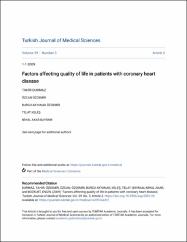Factors affecting quality of life in patients with coronary heart disease

View/
Access
info:eu-repo/semantics/openAccessDate
2009Author
Durmaz, TahirÖzdemir, Özcan
Özdemir, Akyunak Burcu
Keleş, Telat
Bayram, Nihal Akar
Bozkurt, Engin
Metadata
Show full item recordCitation
Durmaz, T., Özdemir, Ö., Akyunak Özdemir, B., Keleş, T., Akar Bayram, N. & Bozkurt, E. (2009). Factors affecting quality of life in patients with coronary heart disease. Turkish Journal of Medical Sciences, 39(3), 343-351. http://doi.org/10.3906/sag-0901-26Abstract
Amaç: Günümüzde tüm dünyada kardiyovasküler hastalıklar en sık ölüm nedenidir ve yaşam kalitesinde ciddi azalmaya yol açmaktadır. Bu çalışmada ülkemizde, koroner arter hastalarında yaşam kalitesi ve yaşam kalitesini etkileyen faktörler araştırılmıştır. Gereç ve Yöntemler: Çalışmaya koroner arter hastalığı (KAH) tanısı konulmuş 85 hasta alınmıştır. Veriler Ferrans ve Power yaşam kalitesi endeksinin kardiyak versiyonu ve araştırmacılar tarafından hazırlanan anket ile toplanmış ve değerlendirilmiştir. Bulgular: Evli ve daha yüksek gelir düzeyine sahip hastalarda sosyal yaşam kalitesi değerleri daha yüksektir. Kalp sorunları nedeniyle günlük işlerinde zorluk yaşayan hastalarda ise yaşam kalitesi düşük bulunmuştur. İlginç olarak daha önce geçirilmiş perkütan koroner girişim veya cerrahi öyküsü olanlarda yaşam kalitesi değerleri benzer öyküsü olmayan hastalarla benzer bulunmuştur. Duygusal ve sosyal destek alanlarda sosyal/ekonomik ve enstrümental destek alanlarda ise global yaşam kalitesi değerleri daha yüksek bulunmuştur. Global yaşam kalitesini etkileyen bağımsız değişkenler ise medeni ve maddi durum, geçirilmiş miyokard enfarktüsü (ME) ve günlük işlerde zorluk yaşamak olarak bulunmuştur. Sonuç: Medeni ve maddi durum, geçirilmiş ME ve günlük işlerde zorluk yaşamak KAH olanlarda yaşam kalitesini etkileyen temel faktörlerdir. Sosyal destek, hastaların rehabilitasyonu kolaylaştırıp psikososyal aktivitesini düzelterek yaşam kalitesini artırabilir. Etkin halk sağlığına yönelik girişimler özellikle en duyarlı gruplar olmak üzere KAH olan bireylerde yaşam kalitesini iyileştirmeye yönelik uygulanmalıdır. Background: Cardiovascular diseases are currently the most common cause of death worldwide and associated with significant impairment of quality of life (QOL). In this study, we aimed to evaluate the QOL patients with coronary heart disease (CHD) in our country and the factors associated with QOL in these patients. Materials and Methods: The study population was composed of 85 patients diagnosed with stable CHD. The data were collected using Ferrans and Powers' Quality of Life Index Cardiac Version- IV and the query designed by the investigators. Results: Eighty-five patients (29 female, 56 male; ages between 38 and 72 years) were enrolled in this study. Married patients and those with greater incomes had greater QOL scores. Patients who had difficulties in daily works due to cardiac problems had lower QOL. Interestingly, patients with previous coronary intervention or surgey had similar QOL scores compared to those without. Patients who got emotional and social support had a greater social/economic score and who were able to get tangible social support had a higher global QOL score. Independent variables affecting the global QOL were marital and financial status, prior myocardial infarction (MI), and having difficulty in daily works. Conclusion: Marital and financial status, prior MI, and having difficulty in daily works are the main determinants for the QOL in patients with CHD. Social support may increase the effectiveness of their rehabilitation and psychosocial activity, thereby QOL. Effective public health interventions should be aimed at improving QOL, especially in the most vulnerable groups.
Source
Turkish Journal of Medical SciencesVolume
39Issue
3URI
https://app.trdizin.gov.tr/makale/T1RReE5qYzMhttps://hdl.handle.net/11436/4788
http://doi.org/10.3906/sag-0901-26

















